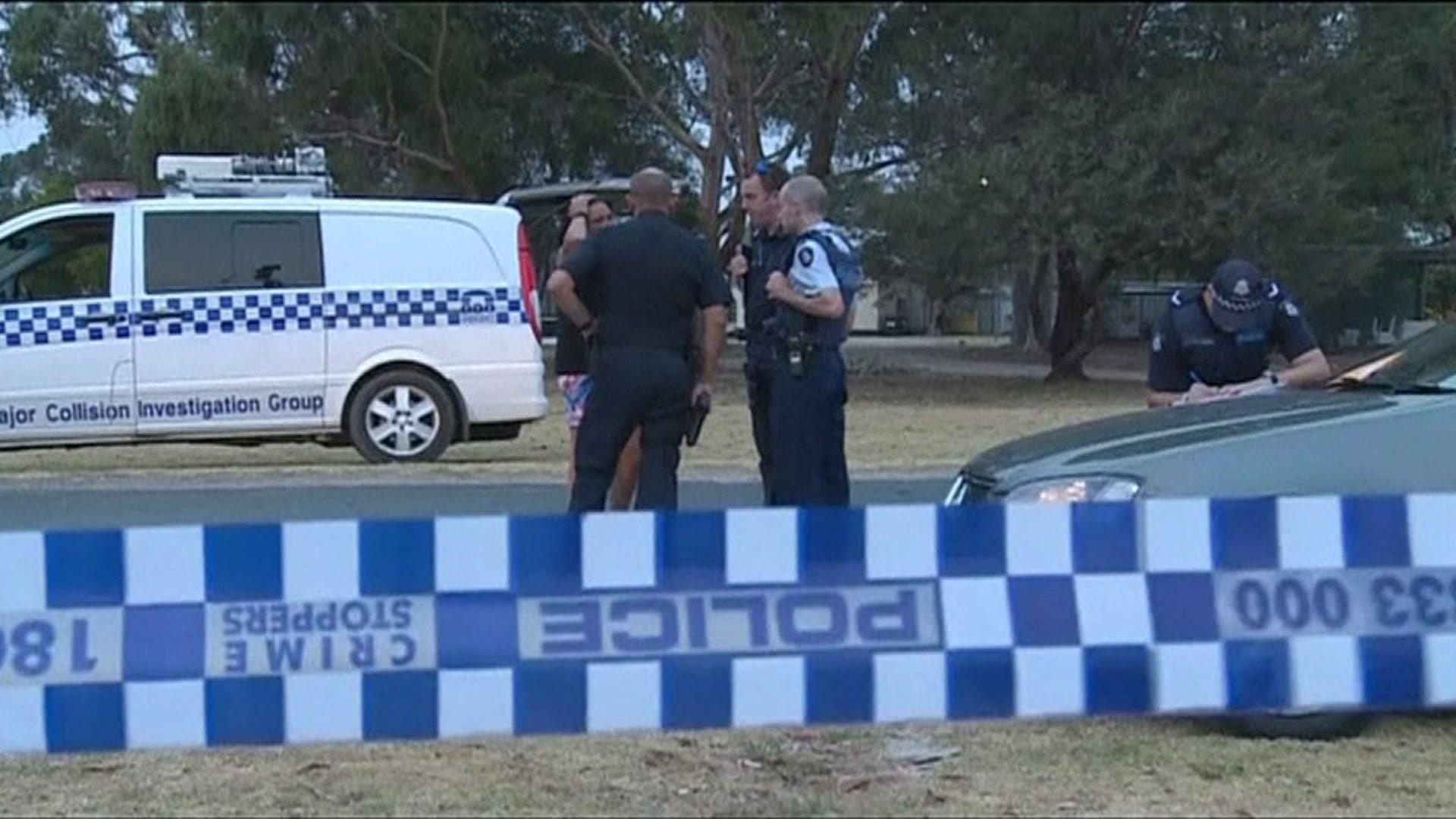Australia's 'perfect storm' of domestic violence
- Published
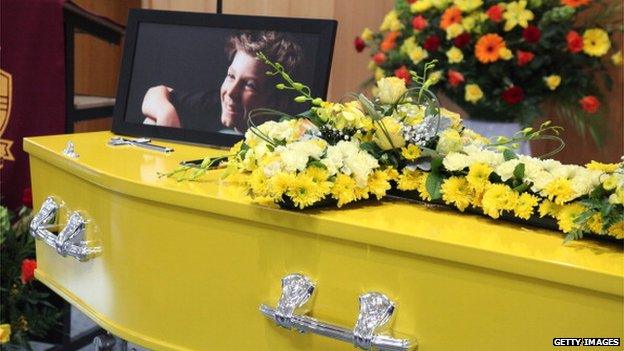
Cases including the murder of Luke Batty by his father have heightened debate over domestic violence
A spate of family murders in Victoria has pushed the issue of domestic violence to the forefront of the state's election campaign.
But it is not only in Victoria. Across Australia, a spotlight is being shone on the failure of government agencies to protect women and children from violent partners and fathers.
The murder of Melbourne woman Kelly Thompson by her ex-partner in February this year was not unusual. On average, one woman is killed every week across Australia by a current or former partner, according to the Australian Institute of Criminology.
Ms Thompson was stabbed to death in her home by Wayne Wood, who then killed himself.
In the months preceding her death, she had spoken to police about Wood's violent behaviour many times and he had regularly breached a police intervention order that was supposed to prevent him going within 200m of her house.
Her story highlighted how courts and police often fail women and children when they are in most need of protection.
Six months after she was killed, Ms Thompson's parents joined Victoria's leading family violence organisations on the steps of the Victorian parliament to speak out at the launch of the No More Deaths campaign, external.
Wendy Thompson said the police "miserably failed" her daughter. "And they've failed two people that are now dead and families that are shattered. And it should never have happened," she told ABC TV.
Political action
The No More Deaths campaign has called on Victoria's political parties to commit to wide-ranging policies to keep women and children safe ahead of the 29 November election.
All three of Victoria's parties - the Coalition, Labor and The Greens - attended the launch. The Greens have adopted much of the campaign's platform, the Labor Party has promised a royal commission into family violence, and the Coalition government has announced a A$150m ($131m; £81m) action package.
The commitments have not come too soon, says Domestic Violence Victoria chief executive officer Fiona McCormack.
"The rates at which Australian women are being assaulted and terrorised are obscene but particularly the number of women and children being murdered in Victoria," she says.
"Every family that we speak to says the same thing: they want the death of their family member to be the catalyst for a turning point in how we respond to this issue."
A combination of factors made this the right time to launch the campaign in Victoria, says senior policy officer at the Federation of Community Legal Centres, Chris Atmore.
"This year, there has been a lot of media attention on several family violence killings that really touched the public and as a consequence, touched politicians, particularly because two of these killings happened in public," says Dr Atmore.
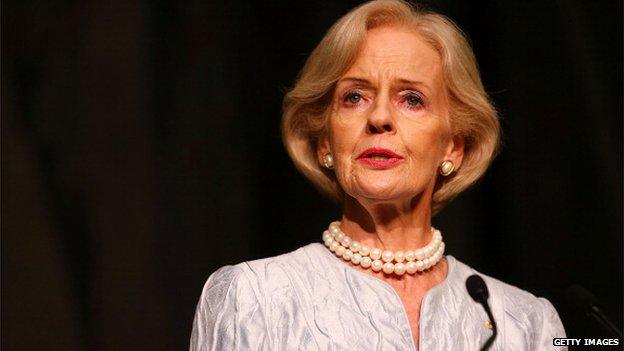
Former governor-general Quentin Bryce is chairing a task force on family violence in Queensland
In April, 33-year-old Fiona Warzywoda was stabbed to death by her partner, Craig McDermott, in a busy suburban shopping centre in Melbourne.
Only hours before, she had attended court in relation to an order preventing McDermott from approaching her.
"That case really touched the community directly, the people in the shopping centre, the shopkeepers … and there was a public vigil organised by her family," says Mr Atmore.
The emergence of Luke Batty's mother as an articulate advocate for the rights of women and children at risk has also changed public attitudes, she says.
In February, 11-year-old Luke was beaten with a cricket bat and then stabbed by his father in front of horrified onlookers at a cricket training session in rural Victoria.
"Rosie Batty has emerged as an extraordinary advocate for change… politicians have been falling over themselves to meet her," says Dr Atmore.
"It's almost like a perfect storm… We have had a sense that our politicians are taking the issue more seriously in recent months because we have been invited to sit at the table."
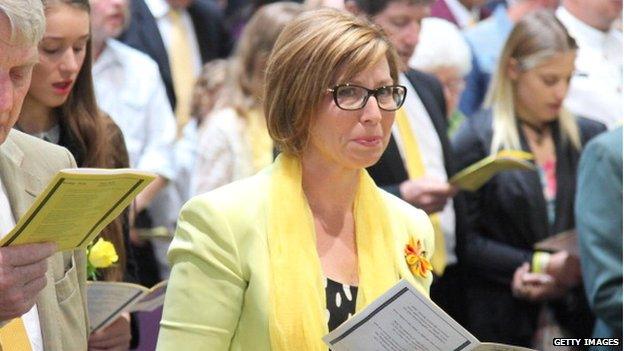
Rosie Batty, seen here at her son's funeral in February, has become a passionate anti-violence activist
State by state
Legislators and police have been under pressure in other states and public attitudes about the issue are being questioned.
In Queensland, former governor-general Dame Quentin Bryce last month said the gravity and severity of domestic violence in that state was far worse than people realised. Dame Quentin is chairing a task force reviewing the service and facilities available to victims of family violence.
In Western Australia, the family of murdered indigenous woman Andrea Pickett, a mother of 13 children, are suing the state government and police service in what lawyers are calling a landmark case. They are suing over the authorities' failure to act despite Ms Pickett's numerous reports to police about her estranged husband's violence.
In New South Wales, the Labor Party says it will establish a specialist court for domestic violence and sexual assault cases if it wins next year's state election.
Moo Baulch, acting chief executive officer of community organisation Domestic Violence NSW, welcomed Labor's announcement. However, she said many people still view domestic violence as something that happens behind closed doors.
She is disturbed that some media have portrayed Geoff Hunt, who in September killed his wife and children on their rural property in NSW and then killed himself, as a victim.
There have been suggestions Mr Hunt had snapped because of the burden of looking after his disabled wife.
"In this day and age, it is amazing that we will make this kind of excuse for a murder. As a nation we have got a long way to go," says Ms Baulch.
- Published10 September 2014
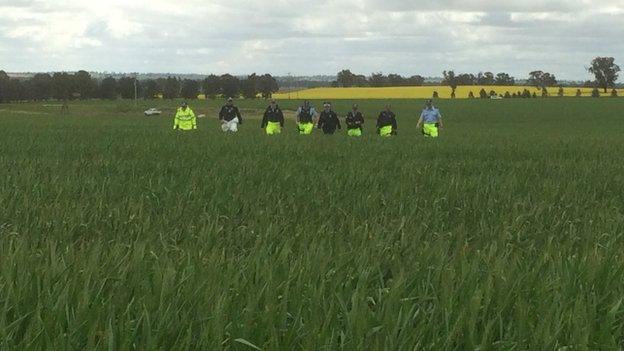
- Published14 February 2014
